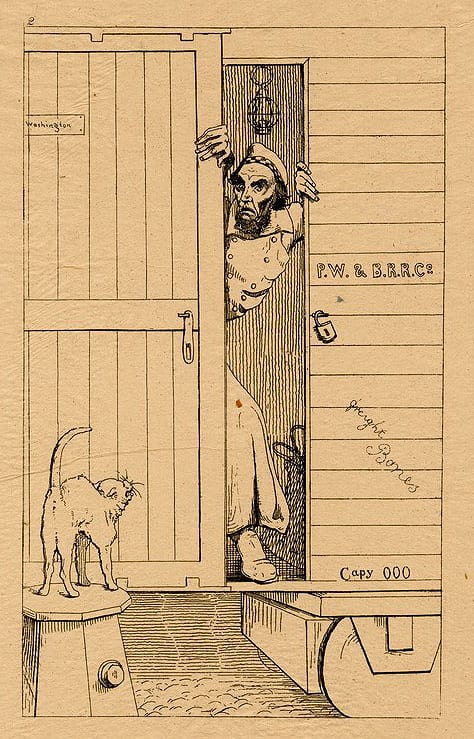Lincoln’s Ascent to Power & Lessons in Leadership
- In February 1861, President-elect Abraham Lincoln traveled from Springfield to Washington, visiting his supporters and finding his voice on his way to taking the Oath of Office on March 4.
- In February 2016, I traveled around campus, learned a few things and concluded the month with Spring Break.
 In my last post I gave you a super brief summary of the Civil War and presented the case that Lincoln faced many problems leading up to his presidency — and even during the war. In this post, I want to talk about some of those.
In my last post I gave you a super brief summary of the Civil War and presented the case that Lincoln faced many problems leading up to his presidency — and even during the war. In this post, I want to talk about some of those.
For the most part, Lincoln’s trip to Washington D.C. from Illinois was uneventful. He stopped in 27 cities and was greeted by crowds of supporters who he spoke to about his plan-of-action while in office. However, one city in particular posed a slight problem for him — Baltimore. You may have heard about the Baltimore Plot, or you may not have. It was a supposed plot to assassinate Lincoln upon his arrival at the train station. His security caught wind of the plan and insisted that he bypass Baltimore — so he proceeded directly from Pennsylvania to Washington. Lincoln did not want to do this, but despite his many reservations about skipping the city, his convoy continued straight onto Washington.
Many people did not actually like this move, and Lincoln was ridiculed because of it. Some newspapers created caricatures of him as a coward, like the picture included, and they said that he was weak and would not be able run the country to the standards the people would have wanted. The people of the Union began to question their decision and his ability to lead them.
Even after the Baltimore Plot was cleared up, Lincoln still faced issues and problems with the people around him. He had cabinet members who made decisions behind his back, generals who did not take action against the Confederate troops, and a nation that was divided and unable to stand together as one. You would think that people would be more inclined to listen to their Commander-in-Chief, but with the tensions surrounding Lincoln’s presidency, it is more understandable why people did not listen. Now, I’m not saying this is a valid reason for not listening to your boss, and his words and actions should not be undermined at any point, but this is the root of all the problems. Secretary of War Cameron essentially went behind Lincoln’s back and tried to create actions that directly countered his ideas and weakened Lincoln’s relationship with his other cabinet members. General McClellan was cocky, hotheaded, and timid — he continually set up attacks on Confederate troops and then failed to attack further and defeat them when he could.
This was Lincoln’s biggest problem area and the one with which he struggled the most. General McClellan was a West Point graduate and extremely knowledgeable of war tactics — much more than me, so I’m going to do my best to explain what was going on. During the war, more specifically the Peninsula Campaign in which the Union forces attempted to take Richmond, McClellan failed to keep the trust of Lincoln. Trust was necessary to win the war, and this is what I have taken away from this reading and learning experience. The war was a complicated political situation that cannot be summed up by one thing. However, trust was something that every participant needed to have. Lincoln’s actions in removing McClellan from his position and appointing General Grant taught me that sometimes you have to make a decision that is not always the easiest or most popular. I know this sounds trivial or makes it seem that I’m diminishing the decisions Lincoln had to make throughout his presidency and the war, but it is true. There are times when I have to trust my own judgment and make an unpopular decision, not at all like the ones Lincoln had to make. His resiliency and ability to stand by what he believed shows me that even through the darkest times, it is still possible to come out on the other side and “win.”
Abby Norberg
References
Image: https://www.google.com/search?q=lincoln%27s+journey+to+washington&
rlz=1C5CHFA_enUS579US579&espv=2&biw=1280&bih=608&source=
lnms&tbm=isch&sa=X&ved=0ahUKEwiOkaaH4ZPLAhUEWD4KHQJzArcQ_AUIBigB#tbm
=isch&q=lincoln+in+baltimore&imgrc=czAy3FbbsnqkTM%3A
Opening fact: http://www.smithsonianmag.com/history/lincolns-whistle-
stop-trip-to-washington-161974/?no-ist





